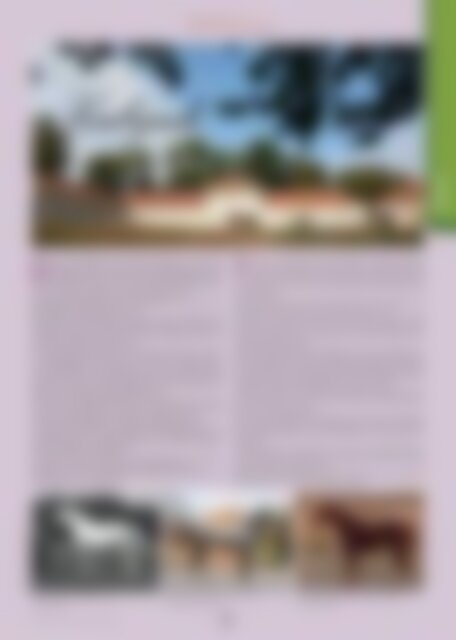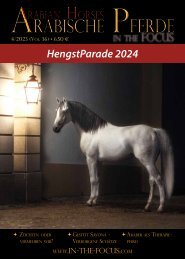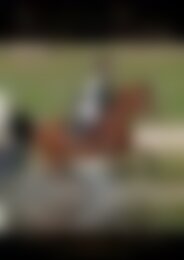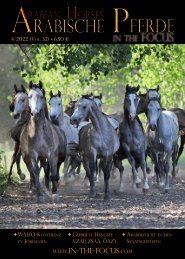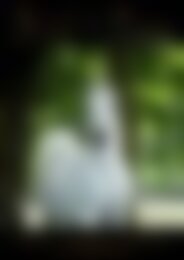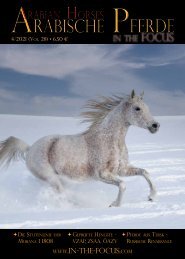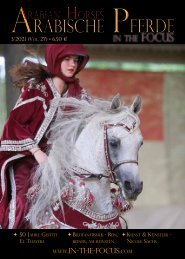Arabische Pferde IN THE FOCUS 1/2023 (Vol. 33) - public
Zeitschrift für Liebhaber und Züchter arabischer Pferde
Zeitschrift für Liebhaber und Züchter arabischer Pferde
Sie wollen auch ein ePaper? Erhöhen Sie die Reichweite Ihrer Titel.
YUMPU macht aus Druck-PDFs automatisch weboptimierte ePaper, die Google liebt.
DAS STAATSGESTÜT<br />
<strong>THE</strong><br />
Kabijuk<br />
STATE STUD<br />
Zucht<br />
Das einzige überlebende Staatsgestüt Bulgariens ist das Nationalgestüt<br />
Kabijuk. Es wurde 1864 als Militärgestüt zur Zucht<br />
von <strong>Pferde</strong>n für die türkische Armee gegründet. Während des<br />
Russisch-Türkischen Krieges 1877-1878 wurden alle <strong>Pferde</strong> des Gestüts<br />
in die Türkei exportiert und das Gestüt geschlossen.<br />
Die eigentliche Wiederaufnahme der Aktivitäten war 1894. Die <strong>Vol</strong>lblutaraberzucht<br />
folgte jedoch erst 1977.<br />
Die Finanzkrise nach dem Ende des kommunistischen Regimes 1989<br />
reduzierte die Subventionen für die <strong>Pferde</strong> und führte zu einer finanziellen<br />
Dauersituation innerhalb des Gestüts. Folglich ging die Zahl<br />
der <strong>Pferde</strong> in Kabijuk drastisch zurück.<br />
Zur Finanzierung der <strong>Pferde</strong>zucht verfügt das Gestüt über zusätzliche<br />
Nebenabteilungen für die Zucht von Rindern, Schafen, Schweinen<br />
und Geflügel. Es ist Staatseigentum und wird vom Ministerium<br />
für Landwirtschaft und Ernährung verwaltet. Schwerpunkte sind die<br />
<strong>Pferde</strong>zucht und die staatlich geförderte Erhaltung einheimischer<br />
Rinder- und Schafrassen als genetische Reserve.<br />
Heute leben auf Kabijuk über 300 <strong>Pferde</strong> verschiedener Rassen. Jedes<br />
Jahr werden mehr als 80 Fohlen geboren und die meisten von ihnen<br />
werden innerhalb Bulgariens, teils auch ins Ausland verkauft.<br />
Es wird eine Zuchtgruppe mit 3 <strong>Vol</strong>lblutaraberhengsten und 16 -stuten<br />
gepflegt (auch 2 Shagya-Hengste und 26 Shagya-Stuten). Sie<br />
basieren auf polnisch-russischen Blutlinien mit kürzlich hinzugekommenem<br />
internationalem Rennblut.<br />
Das Gestüt bietet eine Vielzahl von Dienstleistungen an, u.a. künstliche<br />
Besamung, Prüfung und Körung der jungen <strong>Pferde</strong> usw.<br />
Kabijuk ist auch ein Touristenziel mit 15.000 Touristen, über 90 % von<br />
ihnen kommen aus dem Ausland.<br />
The only surviving state stud of Bulgaria is Kabijuk National<br />
Stud. It was established in 1864 as a military stud for producing<br />
horses for the Turkish army. During the Russian-Turkish war<br />
1877-1878 all the horses of the stud were exported to Turkey and the<br />
stud was closed.<br />
The actual revival of its activities dates back to 1894. However, the<br />
purebred Arabian breeding section followed only in 1977.<br />
The financial crisis after the end of the communist regime in 1989<br />
reduced the subsidies for the horses and led to a permanent deficit<br />
of money within the stud. Consequently, the number of horses in Kabijuk<br />
decreased drastically.<br />
In order to help financing horse breeding, the stud has additional supplementary<br />
departments for breeding cattle, sheep, pigs and poultry.<br />
It is state property, governed by the Ministry of Agriculture and Food.<br />
Its key activities are horse breeding and the state-funded preservation<br />
of indigenous cattle and sheep breeds as a genetic reserve.<br />
Today, over 300 horses of different breeds live at Kabijuk. Every year,<br />
more than 80 foals are born and most of them are sold within Bulgaria<br />
and to foreign markets.<br />
A herd of 3 purebred Arabian stallions, and 16 mares is maintained<br />
(also 2 Shagya-stallions and 26 Shagya-mares). They are based on<br />
Polish-Russian bloodlines with recent additions of international racing<br />
blood.<br />
The stud provides a large number of services for private breeders,<br />
including artificial insemination, testing and licensing of the young<br />
horses, professional education, etc.<br />
Kabijuk is also a tourist destination with 15.000 tourists visiting, and<br />
over 90% of them come from foreign countries.<br />
photos: RAHBA (1), Kabijuk<br />
Moment (Salon / Malpia) *1969<br />
100% Russian<br />
1/<strong>2023</strong> - www.in-the-focus.com<br />
Edit (Ezichnik / Diamantina) *2014<br />
25 % French x Polish<br />
21<br />
Dispozitsia (Dormane / Zaleta) *2009<br />
French x Polish


